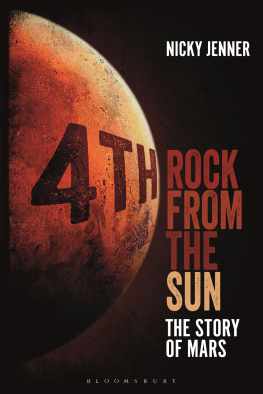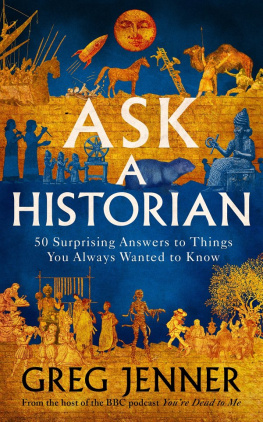Nicky Jenner - 4th Rock from the Sun: The Story of Mars
Here you can read online Nicky Jenner - 4th Rock from the Sun: The Story of Mars full text of the book (entire story) in english for free. Download pdf and epub, get meaning, cover and reviews about this ebook. year: 2017, publisher: Bloomsbury, genre: Science. Description of the work, (preface) as well as reviews are available. Best literature library LitArk.com created for fans of good reading and offers a wide selection of genres:
Romance novel
Science fiction
Adventure
Detective
Science
History
Home and family
Prose
Art
Politics
Computer
Non-fiction
Religion
Business
Children
Humor
Choose a favorite category and find really read worthwhile books. Enjoy immersion in the world of imagination, feel the emotions of the characters or learn something new for yourself, make an fascinating discovery.
- Book:4th Rock from the Sun: The Story of Mars
- Author:
- Publisher:Bloomsbury
- Genre:
- Year:2017
- Rating:3 / 5
- Favourites:Add to favourites
- Your mark:
- 60
- 1
- 2
- 3
- 4
- 5
4th Rock from the Sun: The Story of Mars: summary, description and annotation
We offer to read an annotation, description, summary or preface (depends on what the author of the book "4th Rock from the Sun: The Story of Mars" wrote himself). If you haven't found the necessary information about the book — write in the comments, we will try to find it.
4th Rock from the Sun: The Story of Mars — read online for free the complete book (whole text) full work
Below is the text of the book, divided by pages. System saving the place of the last page read, allows you to conveniently read the book "4th Rock from the Sun: The Story of Mars" online for free, without having to search again every time where you left off. Put a bookmark, and you can go to the page where you finished reading at any time.
Font size:
Interval:
Bookmark:

4TH ROCK FROM THE SUN
Also available in the Bloomsbury Sigma series:
Sex on Earth by Jules Howard
p53: The Gene that Cracked the Cancer Code by Sue Armstrong
Atoms Under the Floorboards by Chris Woodford
Spirals in Time by Helen Scales
Chilled by Tom Jackson
A is for Arsenic by Kathryn Harkup
Breaking the Chains of Gravity by Amy Shira Teitel
Suspicious Minds by Rob Brotherton
Herding Hemingways Cats by Kat Arney
Electronic Dreams by Tom Lean
Sorting the Beef from the Bull by Richard Evershed and Nicola Temple
Death on Earth by Jules Howard
The Tyrannosaur Chronicles by David Hone
Soccermatics by David Sumpter
Big Data by Timandra Harkness
Goldilocks and the Water Bears by Louisa Preston
Science and the City by Laurie Winkless
Bring Back the King by Helen Pilcher
Furry Logic by Matin Durrani and Liz Kalaugher
Built on Bones by Brenna Hassett
My European Family by Karin Bojs

Table of Contents
Id like to say a huge and sincere thank you to everyone who helped me produce this book, including the scientists who patiently fielded my queries and provided their time and expertise, everyone who granted me permission to reprint their wonderful images of Mars, and the fantastic editors and designers at Bloomsbury Sigma for making the process so pleasant. My biggest thank you goes to my ever-supportive husband Angus, who happily and voluntarily took on multiple jobs proofreader, literary critic, motivational speaker, personal barista during the writing process.
For as long as humans have existed, weve gazed at the sky and dreamt of exploring the Universe. Weve stared at the stars and planets nearest to us, noting their dancing motions through the sky and their bright, mottled surfaces, learning more about their characteristics and discovering little families of moons, majestic ring systems, immense swirling storms and volcanoes taller than the very tallest tip of Earth.
Our enthusiasm for exploring the cosmos has been around for centuries. Weve sent spacecraft to explore and land on asteroids and comets, and paid visits some fleeting fly-bys, others longer-lived landers, orbiters and rovers to every planet in the Solar System. Weve sent humans to walk around, drive and play golf on the surface of the Moon, and launched willing human guinea pigs into space to spend months at a time in a cramped tin can falling around the Earth, occasionally suiting up and venturing out into space.
Our fascination with space is understandable. The Solar System alone is packed with fascinating and exciting worlds: the mysterious, scorching surface of smoggy Venus, the delicate rings of the Saturnian system, the diverse and distinctive moons of Jupiter, the heart-stamped surface of distant Pluto (it may no longer be a planet, but its far from boring). However, one planet has captivated stargazers like no other and continues to do so today: Mars, the Red Planet.
Mars is a favourite target, said Dr Firouz Naderi, director for Solar System Exploration at NASAs Jet Propulsion Laboratory in California, US, in a 2003 NASA release preceding the landing of the hugely successful Spirit and Opportunity rovers. We the United States and former USSR have been going to Mars for 40 years. The first time we flew by a planet, it was Mars. The first time we orbited a planet, it was Mars. The first time we landed on a planet it was Mars, and the first time we roved around the surface of a planet, it was Mars. We go there often.
Even if your primary relationship with Mars is in the form of the eponymous chocolate bar and who would blame you? its likely that this single-minded focus over the years has caused you to know at least a little about the planet itself. Mars is the most-googled planet after Earth itself, and weve sent more probes to Mars than any body in the Solar System bar the Moon (or tried to, anyway). Images and data flood in thick and fast from the NASA rovers trundling around on the planets surface, and from the international fleet of robots currently in orbit around Mars. Numerous governmental and private organisations from all over the world have plans in the pipeline for visiting Mars manned and unmanned in the next decade or two, and new announcements seem to pop up weekly.
Its easy to get caught up in the excitement, but its important to justify our love affair with the Red Planet especially when missions to Mars are slated to cost a lot of money in the near future and have the added complication of failing unusually often. Why do we want to visit Mars so badly? We have a whole host of intriguing and unique worlds in our little patch of space. Is Mars really so special?
A quick-fire tour of the Red Planet
Mars needs YOU! announced a series of light-hearted NASA posters designed in 2009. Explorers wanted on the journey to Mars!
Fancy working a night shift on Marss largest moon, Phobos? Are you a green-thumbed farmer longing to rake the red-hued soil, harvesting lettuce, radishes, peas and tomatoes for the outposts canteen? Perhaps youre more of the roving explorer type, and would prefer to survey and map the alien terrain or youd be more partial to teaching future explorers all there is to know about the Red Planet and its little cosmic family. Hiking and caving enthusiasts can enjoy the largest canyon in the Solar System (Valles Marineris!), geologists can marvel over the out-of-this-world rock forms, mammoth volcanoes (Olympus Mons!) and chalky dust, and astronomers can track Phoboss speedy backwards race through the pink-tinted sky. Mars has it all if you could only afford the trip.
With rose-tinted glasses discarded, Mars would actually be an appalling choice of holiday destination for, well, mostly everyone (avid wannabe space explorers, such as the author, excepted).
For one, the trip there would be thumb-twiddlingly boring. Mars is the fourth planet from the Sun after Mercury, Venus and Earth, and is bounded on its outer side by the rocky asteroid belt. The planet sits hundreds of millions of kilometres away from Earth. The exact distance changes depending on where the two planets are sitting in their orbits, but the average separation is around 225 million kilometres (140 million miles).
Even in the best-case scenario, itd take many months to get to Mars. Youre looking at an average trip of eight or so months to travel there and the same to get back. Due to the conditions and planetary alignments needed for launch, youd also need to spend a few months at Mars before you could even think about heading home. Assuming everything went according to plan, a round trip would take somewhere between 18 months and three years, depending on the type of orbit used and thats without any time spent on the planets surface.
The surface itself is freezing, arid, dusty and dry. The entire planet is essentially a huge desert. Its covered in tiny grains of sand and soil and broken-down rock (regolith) that are rich in rusting iron painting the planet in its characteristic hues of yellow, orange, red, brown and butterscotch and a thick coating of dust that resembles finely milled talcum powder in texture. This dust sweeps and wraps around the planets surface, interfering with any equipment we currently have sitting on the Red Planet and coating it in thick, powdery, perpetual blankets of detritus.
Martian dust storms grow larger than any on Earth. Every year Mars experiences incredible continent-sized dust storms that last for weeks at a time and every few years these storms grow so large that they cover the entire planet. These storms are thought to be caused by sunlight heating the planet, causing warm air to rise and carry dust with it as it does so. The scale of Marss storms is likely worsened by the fact that Mars is mostly desert, allowing storms to grow and scoop up material almost endlessly with few obstructions. Dust storms can cover huge portions of Marss surface for weeks or months on end, whipping up dust devils and throwing dust particles into the Martian sky. Dust often hangs in the air, dimming and tinting it in shades of pinky-red and reducing the amount of sunlight filtering down to the surface.
Font size:
Interval:
Bookmark:
Similar books «4th Rock from the Sun: The Story of Mars»
Look at similar books to 4th Rock from the Sun: The Story of Mars. We have selected literature similar in name and meaning in the hope of providing readers with more options to find new, interesting, not yet read works.
Discussion, reviews of the book 4th Rock from the Sun: The Story of Mars and just readers' own opinions. Leave your comments, write what you think about the work, its meaning or the main characters. Specify what exactly you liked and what you didn't like, and why you think so.


![Dzhon Makdonald - Nicky and the Tin Finge [story]](/uploads/posts/book/918175/thumbs/dzhon-makdonald-nicky-and-the-tin-finge-story.jpg)








